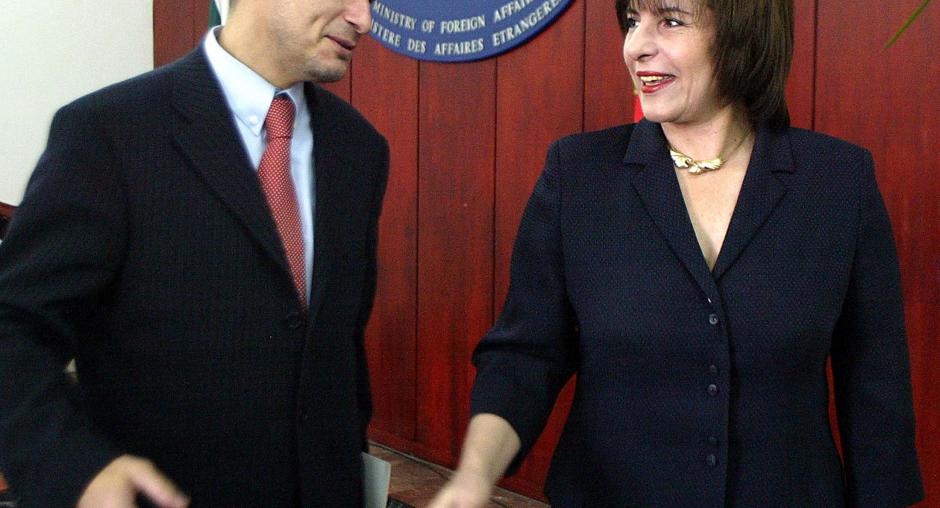Newsroom
OSCE Chairman-in-Office, visiting Skopje, praises progress in Euro-Atlantic integration
SKOPJE 19 October 2004

(Reuters/Ognen Teofilovski)OSCE Chairman Solomon Passy meets Foreign Minister Mitreva in Skopje, 19 October 2004. (Reuters/Ognen Teofilovski) Photo details
SKOPJE, 19 October 2004 - The OSCE Chairman-in-Office, Bulgarian Foreign Minister Solomon Passy, congratulated the political leadership in the former Yugoslav Republic of Macedonia for its achievements in establishing security and stability in the country as well as for progress towards establishing democracy, the rule of law and the market economy.
During a visit to Skopje, he also praised the success of the country in coming closer to Euro-Atlantic structures.
The Chairman-in-Office strongly supported the Euro-Atlantic aspirations of the country and expressed the view that the Government should continue with the implementation of the necessary reforms.
"Against this background, I share the view that the OSCE presence in Macedonia should be downsized. For the time being, however, the Mission has a role to play in the final implementation of the Ohrid Framework Agreement," Minister Passy said.
The OSCE Chairman also discussed the implications of the forthcoming referendum on the territorial organization of the country. He expressed his belief that the referendum, which will be monitored by the OSCE, will be conducted in line with international standards and democratic principles.
"I am confident that with their vote on 7 November, the citizens will decide in favour of their Euro-Atlantic future. It is important to remain focussed on that goal and to work for its prompt realization," he said.
During his visit, the Chairman-in-Office was received by President Branko Crvenkovski. He also had meetings with Prime Minister Hari Kostov, Foreign Minister Ilinka Mitreva and the leaders of major political parties - Ali Ahmeti (DUI), Nikola Gruevski (VMRO-DDPMNE) and Arben Xhaferi (DPA).
Minister Passy also paid tribute to the work of the OSCE Mission in assisting the Government with the implementation of its OSCE commitments.
"The Mission's work in helping combat trafficking, developing local broadcasting, supporting education and training local officials on the technical aspects of decentralisation should be particularly recognized," he added.
During a visit to Skopje, he also praised the success of the country in coming closer to Euro-Atlantic structures.
The Chairman-in-Office strongly supported the Euro-Atlantic aspirations of the country and expressed the view that the Government should continue with the implementation of the necessary reforms.
"Against this background, I share the view that the OSCE presence in Macedonia should be downsized. For the time being, however, the Mission has a role to play in the final implementation of the Ohrid Framework Agreement," Minister Passy said.
The OSCE Chairman also discussed the implications of the forthcoming referendum on the territorial organization of the country. He expressed his belief that the referendum, which will be monitored by the OSCE, will be conducted in line with international standards and democratic principles.
"I am confident that with their vote on 7 November, the citizens will decide in favour of their Euro-Atlantic future. It is important to remain focussed on that goal and to work for its prompt realization," he said.
During his visit, the Chairman-in-Office was received by President Branko Crvenkovski. He also had meetings with Prime Minister Hari Kostov, Foreign Minister Ilinka Mitreva and the leaders of major political parties - Ali Ahmeti (DUI), Nikola Gruevski (VMRO-DDPMNE) and Arben Xhaferi (DPA).
Minister Passy also paid tribute to the work of the OSCE Mission in assisting the Government with the implementation of its OSCE commitments.
"The Mission's work in helping combat trafficking, developing local broadcasting, supporting education and training local officials on the technical aspects of decentralisation should be particularly recognized," he added.
